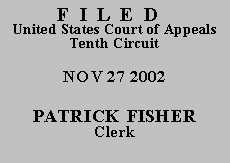

| UNITED STATES OF AMERICA,
Plaintiff - Appellee, Defendant - Appellant. |
No. 02-5087
D.C. No. 89-CR-36-C |
Mr. McElroy was convicted on a twenty-six count indictment for various crimes, including conspiracy, wire fraud, and aiding and abetting in violation of federal banking laws. On February 1, 1990, he received a sentence of four years for Count One, and concurrent five-year terms of probation for Counts Two through Twenty-six "to commence after being released from having served Count One." Rec., vol. II at 25 (Trans. of Sentencing Hearing).(1) Because of good time served, Mr. McElroy was released on parole on October 18, 1992. He completed the terms of parole and commenced the terms of probation on the remaining counts on August 5, 1993.
In 1996, Mr. McElroy violated the terms of his probation and was ordered to serve a three year term in custody on Count Two, during which the probation was suspended as to Counts Three through Twenty-six. On October 20, 1997, he was again released from custody early for good time served. At that time he began serving his parole for Count Two, as well as the concurrent probation terms on the remaining counts. In 1999, some weeks prior to his potential discharge date for those remaining counts, Mr. McElroy again violated his probation, as a result of which he received a sentence of five year concurrent terms. At this point, he failed to appear voluntarily at the prison, was convicted for that failure to appear, and was sentenced to a term of twelve months and one day to be served consecutively to the revocation sentence.
Mr. McElroy now asserts that the district court committed clear error when it found that his probation on Counts Two through Twenty-six originally began to run in August of 1993 when he completed parole on Count One, contending instead that it should have commenced when he was initially released from prison on October 18, 1992. If he is correct, the district court did not have jurisdiction to revoke his probation in 1999 because he would have already completed his probationary sentence by that time.
We have held that "[t]he controlling consideration in interpreting when a probation period commences is the intention of the Court imposing the sentence, to be found in the language employed to create the probationary status." United States v. Einspahr, 35 F.3d 505, 506 (10th Cir. 1994). Furthermore, "[u]nless the sentencing court specifically indicated that a consecutive sentence of probation begins at a prisoner's release from custody or confinement, the default assumption is that the full term of the earlier sentence must be completed before the probation period commences." Id. at 507.
The district court used different language in imposing the initial sentence on Mr. McElroy as compared with the other five defendants who participated in the same crimes. Their terms of probation were to begin "after the service of imprisonment." See, e.g., rec., vol II at 6. As a result, Mr. McElroy argued to the district court that the time his probation was to commence was not clear and that his sentence ought to be interpreted as ordering treatment identical to his codefendants despite the distinction in the language. However, the district court stated that the distinction it made was intentional and that its language was unambiguous in providing for Mr. McElroy's consecutive sentence to begin after he had completed his parole term on Count One. Rec., vol. I, doc. 285 at 8. After reviewing the record, we are not convinced that the district court erred.
Accordingly, we AFFIRM.
ENTERED FOR THE COURT
Stephanie K. Seymour
Circuit Judge
*.This order and judgment is not binding precedent, except under the doctrines of law of the case, res judicata, and collateral estoppel. The court generally disfavors the citation of orders and judgments; nevertheless, an order and judgment may be cited under the terms and conditions of 10th Cir. R. 36.3.
1. The court's written judgment described probation as commencing "upon expiration of the sentence imposed as to Count One." Rec., vol. I, doc. 267, exhib. 1.